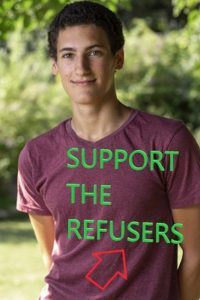
From Refuser Solidarity Network | Original Article
Plainclothes military police officers arrived at conscientious objector Hillel Grami’s home on Sunday, 29 July, six days after he failed to report at the induction center and undergo enlistment. He was arrested at home — an exceptional action by the Israeli army that we have not seen in in recent years.
Hilel is a 19 year old Israeli, who refuses to be a soldier of the Israeli Occupation. His personal statement is published here for the first time in English.
My name is Hilel Garmi. I am 19 years old and scheduled to be drafted to the Israeli army at the beginning of August 2018.
Recently, in the context of the wave of unarmed Palestinian demonstrations at the Gaza border fence, I took the time to read statements by Ahmed Abu Ratima, one of the organizers, and I was deeply impressed to discover people who endorse unarmed alternatives for dealing with the situation between the Mediterranean and the River Jordan. Like them, I believe in civil disobedience – the use of unarmed resistance in order to emphasize the immorality of the regime.
I have an older brother and two older sisters who served in the military. When I was a young child, the army, for me, was not only an inevitable obligation, but also the pinnacle of my aspirations. I wanted to enlist in the most selective commando unit possible.
But when I grew older and I came to understand the present reality between the Mediterranean Sea and the Jordan River, I realized enlisting would be impossible for me.
I cannot enlist, because from a very young age I was educated to believe that all humans are equal. I do not believe in some common denominator which all Jews share and which sets them apart from Arabs. I do not believe that I should be treated differently from a child born in Gaza or in Jenin, and I do not believe that the sorrows or the happiness of any of us are more important than those of anyone else. Guided by these beliefs, I had to ask myself what is best for all those living between the Mediterranean and the Jordan River. The three million residents of the West Bank and East Jerusalem live under a military occupation or an imposed annexation that has now lasted more than half a century. The two million residents of Gaza were ‘liberated’ from the occupation only to find themselves under a military siege that has now lasted more than a decade and is imposed by Israeli forces on land, on air and by sea. From the perspective of an ideology that regards all humans as equal, such policies cannot be justified.
Such policies are further unjustified because the Israeli regime is elected by eight million citizens, but in actuality, controls thirteen million lives. The most critical decisions concerning the lives of the residents of the West Bank and Gaza are made by the State of Israel’s government. That government decides which residents of Gaza could enter or depart, it decides what they could import or export, when they have electricity, where they could fish, and where they may move freely within the Gaza Strip area. The government of the State of Israel decides where the residents of the West Bank could travel, which lands they could cultivate, and it can opt to arrest anybody at any time. I am not willing to serve such an undemocratic regime, and therefore am refusing to enlist is my only moral option.
These are not just theoretical matters. Beyond violating the principles of democracy which, I believe, should lay the foundation for any just society, the policies of this regime affect the daily lives of five million Palestinians. The siege of Gaza paralyzed its economy and has caused a humanitarian crisis, with people deprived of a functioning electrical system, and of sufficient potable water. The occupation brought about the concentration of West Bank residents into isolated cantons, and has impaired their daily freedom of movement. It oppresses one population – the Palestinians – in order to enable another population – Israeli Jews – to take control of its territory. I am not willing to be part of an army that enforces such policies on five million people.
I know that most countries need to maintain an army for self-protection, but this cannot serve as a justification for any use of such an army. Regarding any regime, one must have red lines which one should refuse to cross, and after fifty years of occupation, my red lines have definitely been crossed.
My initial determination to avoid collaborating with the army and to refuse to enlist was personal. However, during the past year I reached the decision to make my refusal to enlist public. That is because I believe that civil disobedience could affect a societal change by appealing to the sense of justice of those more privileged, who reside between the Mediterranean and the Jordan River. Civil disobedience is an appropriate mode of resistance when a regime has lost its legitimacy, and I think that after fifty years without democracy, the regime between the Mediterranean and the Jordan River has lost its legitimacy. The wave of Palestinian demonstrations by the Gaza border fence and the army’s reaction to them have rendered that mode of resistance particularly relevant nowadays, and therefore, like those demonstrators, I decided to adopt civil disobedience.
As a person who was born into the more powerful side of the hierarchy between the Mediterranean and the Jordan River, I was given the power as well as the obligation to try to fight that hierarchy.
Hilel Garmi, August 2018
